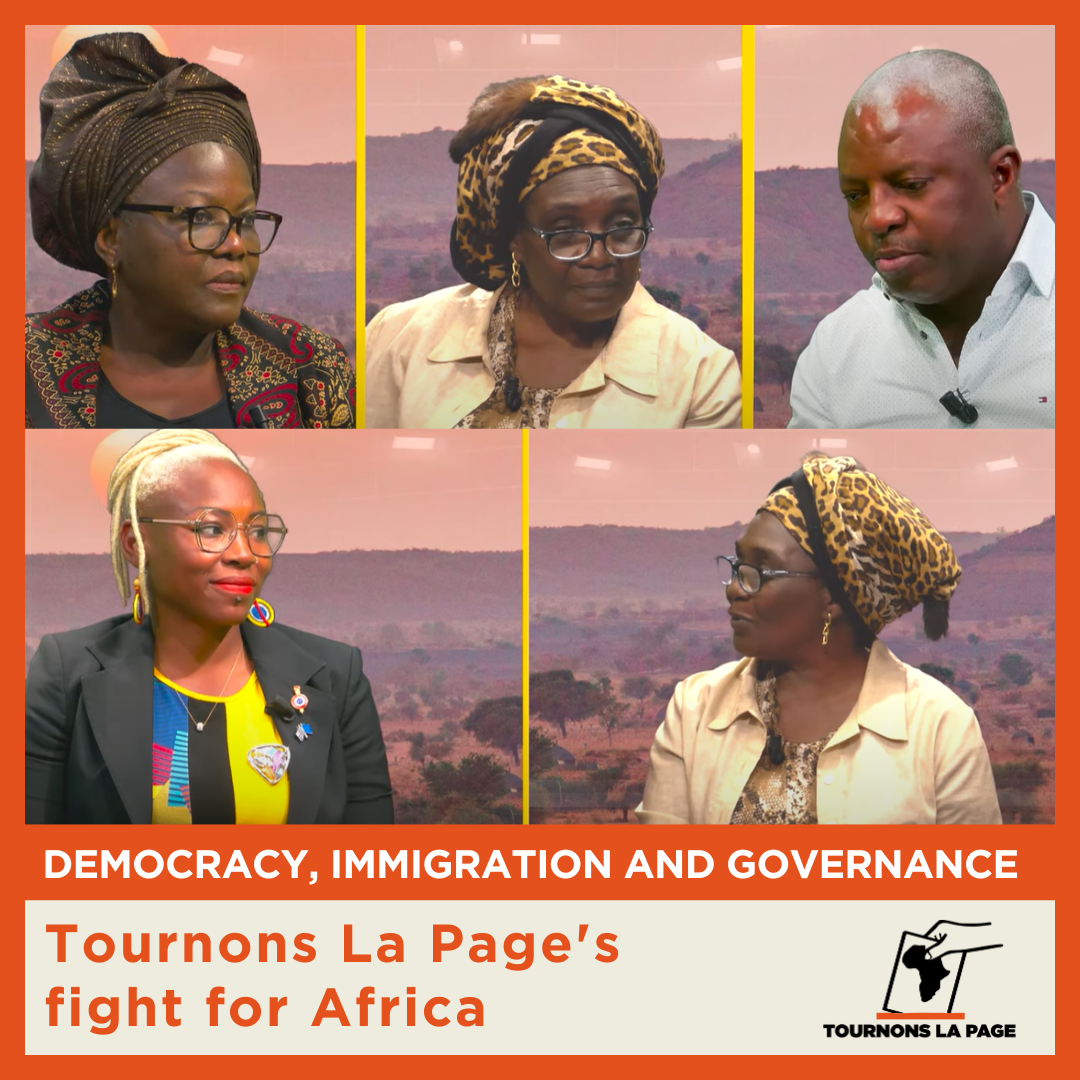To mark the 10th anniversary of Tournons La Page (TLP), TLP founding member and TLP-Congo coordinator Brice Mackosso, TLP treasurer Brigitte Ameganvi and Régine Komokoli, departmental councillor in Brittany (France), were interviewed by Sadio Morel-Kanté on the “Tumultes sur les libertés fondamentales” program broadcast on October 20, 2024 on the “Global Africa Telesud” Youtube channel. Topics covered included the history of the TLP movement, the challenges of democracy in Africa, the relationship between poor governance in African countries and mass immigration of Africans to France.
“Tournons La Page was created just before the fall of Blaise Compaoré (former president of Burkina Faso, who spent 27 years in power). The appeal was launched on October 15, 2014. Two weeks later, Blaise Compaoré was ousted by the streets,” recalled Brigitte Ameganvi on the history of the movement. For her, there is a correlation between these two events, even if their relationship is not direct. “ But this marks the consequence and effectiveness of citizen mobilizations at the time, since the fall of Blaise Compaoré was essentially due to the massive mobilization of Burkinabé within the Balai Citoyen (a civil society movement),” she explained. The movement began in four countries: Congo, Gabon, Cameroon and the Democratic Republic of Congo, all of which share a desire to bring about democratic change on their territory. “ The need for freedom of expression and democratic values are universal values,” added Brigitte Ameganvi.
Why Tournons La Page?
Today, the TLP movement is present in fifteen African countries and in Europe. It was created to promote democratic change on the African continent. “ The page we want to turn is the page of alternating authoritarian regimes, the page created for democratic alternation. We're working to ensure that the handover of power takes place peacefully in our countries,” emphasized Brice Mackosso. To what extent has this citizens' movement provided democratic answers, despite the constitutional coups d'état? Is this struggle not in vain? In response to these questions, the TLP-Congo coordinator recalled the historical context of the movement's creation. For him, the question of third mandates and constitutional changes was not the subject of debate when the movement was launched. “ It was military coups d'état that were the subject of debate. And today, we have to recognize that this debate is evolving,” he explains.
Mass immigration decried in France, but...
Departmental councillor Régine Komokoli, who describes herself as « a former undocumented migrant, elected representative of the French Republic, Afro-feminist and ecologist activist », responded to Interior Minister Bruno Retailleau's assertion that ’ immigration is not an opportunity ”, in an interview with JDD and LCI. For Régine Komokoli, this statement is “ a scapegoat used to hide the real problems in this country (France, editor's note): ‘It ’s an insult to millions of French citizens of immigrant origin. I am deeply concerned by these remarks, which not only show contempt for the lives of so many people, but also distort the reality of what immigration represents for France.
For her part, Brigitte Ameganvi drew a correlation between the lack of respect for democratic principles and the rush of Africans to France. “ The struggle for democracy is a preventive struggle to prevent illegal immigration. Why is this so? Because, if we fight in our countries for democracy and good governance, it's so that people can find happiness in their own countries. Nobody immigrates out of the blue,” declared Brigitte Ameganvi, before continuing: ” If it weren't for the support of certain Western powers for dictatorial regimes, for fraudulent elections that everyone knows about, people wouldn't need to immigrate . Electoral conflicts and wars in Africa lead to mass emigration and internal displacement. To prevent mass immigration, it is therefore crucial to improve living conditions in migrants' countries of origin














